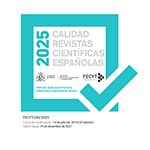‘Tengo un secreto’: cuestionamiento del mundo adulto en álbumes ilustrados
Resumen
‘Tengo un secreto’. ‘Una noche me despertó un ruido espantoso’. Estos enunciados dan origen a dos obras ya clásicas de los autores-ilustradores Isol (Secreto de familia) y Anthony Browne (En el bosque); en ambos casos, los protagonistas narradores se plantean como observadores y actores de situaciones familiares que les desconciertan y producen dolor, dolor que podría ser una expresión más de los procesos que viven los personajes de la literatura infantil acostumbrada a someter a niños y jóvenes a caminos de crecimiento, pérdidas y hallazgos. En estos devenires, no obstante, es habitual que los niños protagonistas sean ‘acompañados’, ‘protegidos’, ‘orientados’ o ‘consolados’ por adultos de referencia. Lo novedoso, en estos y otros casos que analizaremos en el presente trabajo, radica en la posición que toman los personajes infantiles respecto del mundo adulto, al que observan, analizan, critican y, no pocas veces, enjuician duramente. El propósito del artículo es analizar los modos en que se presenta el cuestionamiento del mundo adulto en álbumes ilustrados de dos destacados escritoresilustradores, ubicados geográfica y polisistémicamente en sitios muy distintos, y a partir de este análisis, reflexionar desde la lógica del mundo al revés propuesta por Mijail Bajtin, sobre los alcances de una temática que se posiciona con fuerza en las producciones actuales para niños y jóvenes, evitando dejos de moraleja o añoranzas de libros que comuniquen imágenes de adultos protectores y familias estables que están lejos, como sabemos, de la realidad que hoy enfrentan los lectores en formación.Descargas
Descarga artículo
Licencia
La revista Didáctica. Lengua y Literatura, para fomentar el intercambio global del conocimiento, facilita el acceso sin restricciones a sus contenidos desde el momento de su publicación en la presente edición electrónica, y por eso es una revista de acceso abierto. Los originales publicados en esta revista son propiedad de la Universidad Complutense de Madrid y es obligatorio citar su procedencia en cualquier reproducción total o parcial. Todos los contenidos se distribuyen bajo una licencia de uso y distribución Creative Commons Reconocimiento 4.0 (CC BY 4.0). Esta circunstancia ha de hacerse constar expresamente de esta forma cuando sea necesario. Puede consultar la versión informativa y el texto legal de la licencia.










